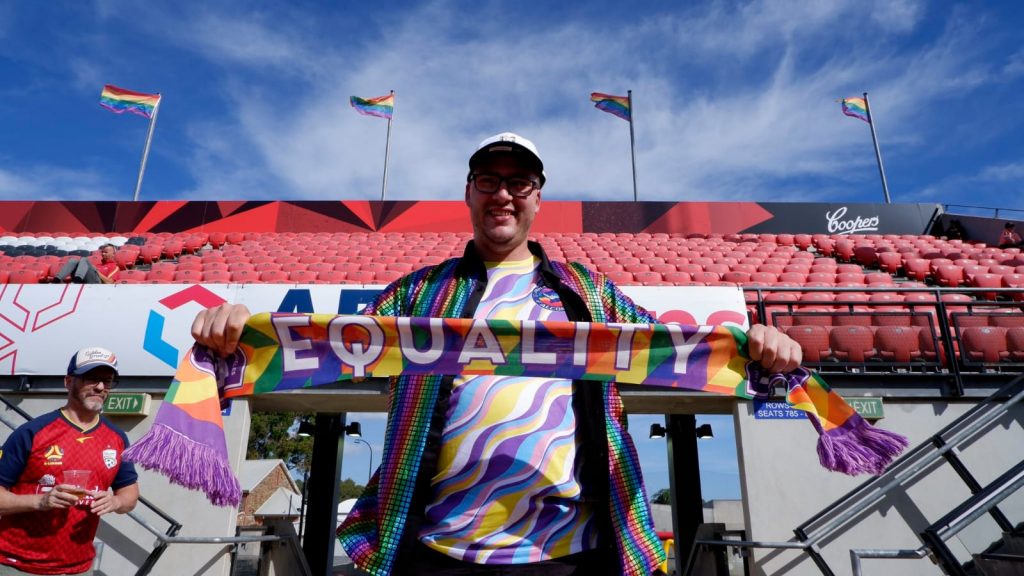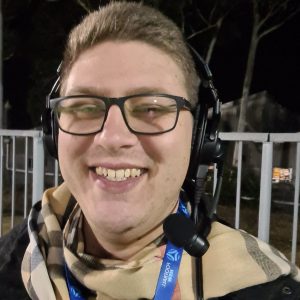‘I hope I’m breaking down barriers’: Poletti on their path to Pride, for Non-Binary People’s Day
Having announced their name change earlier this month, Australian sports journalist Poletti blogs for Sports Media LGBT+ about their self-discovery and the value of visibility; “I want the journey for the next non-binary person to come along in media to be easy than mine was,” they say…

Poletti is a freelance journalist and broadcaster who has contributed significantly to the LGBTQ+ space in Australian sports media.
Shortlisted in the Football Media category at the 2023 Football v Homophobia Awards, they became the first openly non-binary commentator of National Premier League matches in Australia last year and they continue to amplify non-binary and other LGBTQ+ voices across the game.
To mark International Non-Binary People’s Day, Sports Media LGBT+ invited Poletti to share their experiences…
The journey around discovering one’s gender and sexual identity is different for every person.
This is a look at my journey.
I first thought that I was bisexual in my mid-teens and considered that to be the end of my voyage of self-discovery. How wrong I was.
At the time I was looking at my sexuality, I had been away from playing football for many years. I was bullied out of the sport and had turned my attention to rugby league and cricket for my fix of sport as a fan.
My delve back into “the world game” came about by accident. Someone I used to know got me onto following Sydney FC in the A-League, which helped me fall back in love with football.

The same person also got me to try quadball (known at the time as quidditch), which is where the next step of my journey took me.
My gender identity.
Even after I thought I had worked out my sexuality, there was a nagging feeling of something else there.
But I couldn’t work out what it was. It made no sense.
I tried to research it, but I didn’t have the words to describe what I felt so I didn’t know what to look up.
I didn’t have anyone I felt comfortable enough with to talk to about it. I felt very alone and wasn’t sure how to deal with the nagging feeling.
Then quadball came along, and as I slowly integrated myself with my team-mates and the broader community, I discovered a term – non-binary.
At first, I was curious. I looked it up and upon doing so, things began to click into place in my head. It felt right. It felt like home.

Reading the definition and what the term non-binary entails gave me a sense of relief at finally being able to find answers to questions I had been asking myself for years.
It felt right and like home because I had the answers now. I had the knowledge to continue on to the next stage of my journey.
It took me a little over two years, and it included a lot of soul searching, and some heart to hearts with one of my best friends to feel comfortable in saying, “I am non-binary”.
But when I did, it felt like such a relief. I finally felt like I was living the way I was supposed to.
And as I’ve continued down that journey of self-discovery, it wouldn’t have happened without quadball and football.
Without re-discovering my love for football, I wouldn’t have begun to move into the women’s football space, nor into journalism. Both have led me to discovering two people who I look up to in vastly different ways.
On the football front, you have Quinn. The first out transgender and non-binary athlete to win Olympic gold, with Canada.
Quinn is someone who showed me that you can be gender-diverse in the sporting landscape – even if I’m doing it off-field while they’re doing it on the pitch.
I’d be lying if I said getting to interview them wasn’t one of the happiest moments of my journalism career to date, because it truly was.
On the journalism front, you have the ABC’s Samantha Lewis. When I first met Sam, it was at a writers festival very early into my journalism career, and I was concerned about being pigeon-holed as “the Pride journalist”.
Not because I don’t love talking and writing about LGBTQIA+ people in sport. I absolutely do.

But I didn’t want people to dismiss the other work I was doing.
So when Sam was on the panel, I expressed my concern as a rookie journalist and asked for advice.
I won’t share that advice here (mostly because I can’t find it and don’t want to do a disservice to her great words!) but it helped me a ton.
It allowed me to become more confident in the work that I do, and I’ve enjoyed doing a range of LGBTQIA+ related pieces, amongst other things.
There have been plenty of other people along the way to help me out as I continue on my journalism career, with the aim for full-time work in sports. If I named them all, we’d be here all day.
The journey led me to a job in Tasmania, which ultimately did not work out for a couple of reasons. However, leaving Sydney – my support network, my friends, and my family – to go and live halfway across the country led to something good.
It led to me being more confident in discovering more about who I am. I learned a lot on the journalism front in my short time in Tasmania, but I also learned a lot more about myself personally and my gender identity because I had the freedom to do so.
It led to the confidence in me finally changing my name, after years of unhappiness with my old one. It led to me doing more research on things around gender, which will hopefully lead to exciting things in the coming months and years.
Ultimately, the writing of this piece – while cathartic in a way – is not for me.
It’s for you, the reader. It’s for those who are discovering their own gender identity or sexual orientation, or both.
It’s to show them that the journey one takes is not quick or easy. There will be challenges along the way. There will be stops and starts. Many stops and starts. It will take time.
And just when you think you’ve got there, something else may or may not come along which makes you question everything again. And that’s OK. It truly is.

It’s for those who are aspiring to have a media career and think ‘how can I?’, when there’s little to no representation of non-binary and gender diverse individuals.
Every time I do something new in the Australian media space, I’m hoping that I’m breaking down barriers for the next person to come along. Because you can’t be what you can’t see.
I want their journey to be easier than mine was.
As for me, I am non-binary, and I am pansexual – and I’m happy with that.
Our thanks to Poletti for contributing this piece. Follow them on Twitter at @ItsPoletti and access their Linktree here.
Further reading, selected by Poletti…
‘I just came out as non-binary, here’s what that means’ – Arlo’s story (Minus18, January 2021)
10 ways to step up as an ally to non-binary people (Stonewall, July 2021)
What does it mean to be non-binary? (Rachel Rasker for ABC Queer, July 2021)
Sports Media LGBT+ is a network, advocacy, and consultancy group that is helping to build a community of LGBTQ+ people and allies in sport. We’re also a digital publisher and can help with your content requirements. Learn more about us here.
We’re interested in your news and stories. Share with us and tap into a worldwide audience through our Google News affiliate website which attracts thousands of visitors, and our popular social channels. Contact us to discuss how we can help you.


